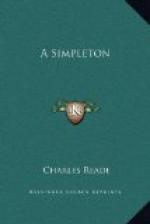Her peace was not to endure long. He was detected in an intrigue in the very village.
The insult struck so home that Phoebe herself, to her parents’ satisfaction, ordered him out of the house at once.
But, when he was gone, she had fits of weeping, and could settle to nothing for a long time.
Months had elapsed, and she was getting a sort of dull tranquillity, when, one evening, taking a walk she had often with him, and mourning her solitude and wasted affection, he waylaid her, and clung to her knees, and shed crocodile tears on her hands, and, after a long resistance, violent at first, but fainter and fainter, got her in his power again, and that so completely that she met him several times by night, being ashamed to be seen with him in those parts by day.
This ended in fresh promises of marriage, and in a constant correspondence by letter. This pest knew exactly how to talk to a woman, and how to write to one. His letters fed the unhappy flame; and, mind you, he sometimes deceived himself, and thought he loved her; but it was only himself he loved. She was an invaluable lover; a faithful, disinterested friend; hers was a vile bargain; his, an excellent one, and he clung to it.
And so they went on. She detected him in another infidelity, and reproached him bitterly; but she had no longer the strength to break with him. Nevertheless, this time she had the sense to make a struggle. She implored him, on her very knees, to show her a little mercy in return for all her love. “For pity’s sake, leave me!” she cried. “You are strong, and I am weak. You can end it forever, and pray do. You don’t want me; you don’t value me: then, leave me, once and for all, and end this hell you keep me in.”
No; he could not, or he would not, leave her alone. Look at a bird’s wings!—how like an angel’s! Yet so vile a thing as a bit of birdlime subdues them utterly; and such was the fascinating power of this mean man over this worthy woman. She was a reader, a thinker, a model of respectability, industry, and sense; a businesswoman, keen and practical; could encounter sharp hands in sharp trades; could buy or sell hogs, calves, or beasts with any farmer or butcher in the country, yet no match for a cunning fool. She had enshrined an idol in her heart, and that heart adored it, and clung to it, though the superior head saw through it, dreaded it, despised it.
No wonder three years of this had drawn a tell-tale wrinkle across the polished brow.
Phoebe Dale had not received a letter for some days; that roused her suspicion and stung her jealousy; she came up to London by fast train, and down to Gravesend directly.
She had a thick veil that concealed her features; and with a little inquiring and bribing, she soon found out that Mr. Falcon was there with a showy dogcart. “Ah!” thought Phoebe, “he has won a little money at play or pigeon-shooting; so now he has no need of me.”




